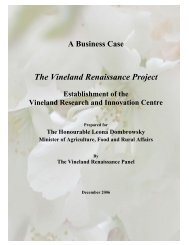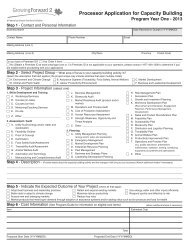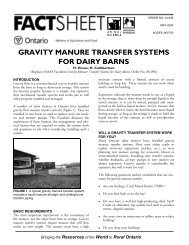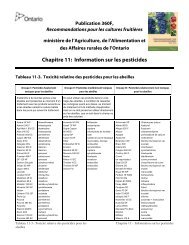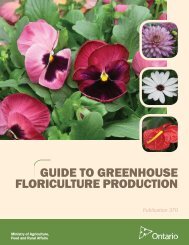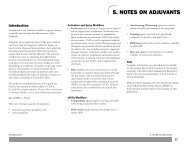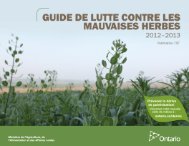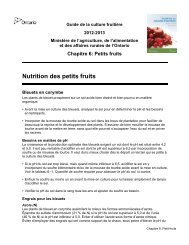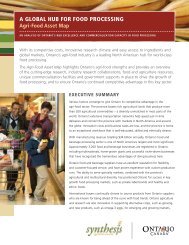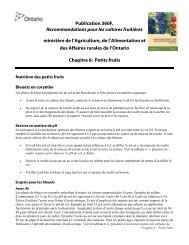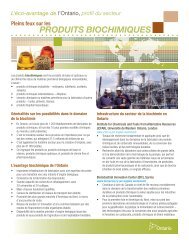In the Work Area of a Fish Processing Plant - Ontario Ministry of ...
In the Work Area of a Fish Processing Plant - Ontario Ministry of ...
In the Work Area of a Fish Processing Plant - Ontario Ministry of ...
You also want an ePaper? Increase the reach of your titles
YUMPU automatically turns print PDFs into web optimized ePapers that Google loves.
<strong>In</strong> <strong>the</strong> <strong>Work</strong> <strong>Area</strong> <strong>of</strong> a<br />
<strong>Fish</strong> <strong>Processing</strong> <strong>Plant</strong>
Everyone who enters <strong>the</strong> work area <strong>of</strong> a<br />
fish processing plant should wear clean<br />
work clo<strong>the</strong>s and try to reduce <strong>the</strong> risk <strong>of</strong><br />
food safety hazards.<br />
Here are some tips on what you can do<br />
to keep <strong>the</strong> fish and fish products you are<br />
preparing safe to eat.<br />
Points to remember:<br />
• The correct hand washing procedure<br />
• Why you should not wear outside clo<strong>the</strong>s in <strong>the</strong><br />
work area<br />
• The two main reasons you should not wear watches<br />
and jewellery in <strong>the</strong> work area
Your <strong>Work</strong> Clo<strong>the</strong>s<br />
Here’s what you should wear:<br />
Hair net: A disposable hair net keeps your hair from falling<br />
onto <strong>the</strong> fish products. All <strong>of</strong> your hair should be tucked<br />
under <strong>the</strong> net.<br />
Beard net: A disposable beard net keeps hair from your<br />
beard out <strong>of</strong> fish products.<br />
Gloves: Some tasks, such as preparing ready to eat fish products<br />
or cleaning <strong>the</strong> work area, require gloves. Once gloves<br />
can no longer be cleaned or sanitized you should throw <strong>the</strong>m<br />
away. New gloves should be kept in a clean, dry spot where<br />
<strong>the</strong>y will not be contaminated by splashes from any cleaning<br />
products or waste.<br />
Your fingernails should be cleaned and trimmed short. You<br />
should not wear nail polish or fake nails.<br />
Smock or jacket: Your smock or jacket should be cleaned and<br />
sanitized at <strong>the</strong> start <strong>of</strong> each shift. It should not have buttons.<br />
Never carry anything in your pockets.<br />
Boots: Boots should be washable, clean and sanitized at <strong>the</strong> beginning and end <strong>of</strong> each shift.<br />
R<br />
You<br />
should wash your boots anytime you:<br />
• Enter <strong>the</strong> work area<br />
• Come in from outside<br />
• Come back into <strong>the</strong> work area after throwing away garbage or <strong>of</strong>fal<br />
• Move between raw, processed and ready-to-eat areas
Washing Your Hands<br />
Washing your hands completely is one <strong>of</strong> <strong>the</strong> most important things you can do to keep fish and fish products safe.<br />
R<br />
The ideal hand washing station<br />
There should be hand washing stations in <strong>the</strong> fish processing areas, washrooms and<br />
common areas <strong>of</strong> <strong>the</strong> plant. There should be hot and cold running water, liquid soap<br />
and/or foam (no bar soap) and paper towel in hands-free dispensers. The sink at this<br />
station is to be used for hand washing only.<br />
How to wash your hands:<br />
1. Wet hands and forearms with warm water.<br />
2. Use soap, ei<strong>the</strong>r liquid or foam.<br />
3. Rub vigorously for 20 seconds.<br />
4. Rinse.<br />
5. Dry your hands with paper towels.<br />
When to wash your hands<br />
You need to wash your hands or replace your gloves anytime you:<br />
• Use <strong>the</strong> washroom<br />
• Eat, drink or smoke<br />
• Cough, sneeze or blow your nose<br />
• Enter or leave <strong>the</strong> work area<br />
• Change tasks between raw and ready-to-eat products<br />
• Handle soiled equipment<br />
• Pick something up <strong>of</strong>f <strong>the</strong> floor<br />
• Handle garbage or <strong>of</strong>fal
What Not to Wear – Or Do!<br />
Watches and jewellery should be kept in a separate<br />
area where you keep your street clo<strong>the</strong>s. Employees<br />
and visitors should not wear watches or o<strong>the</strong>r jewellery<br />
such as rings, necklaces, bracelets and earrings or<br />
have body piercings that you can see because:<br />
• Watches and jewellery could fall <strong>of</strong>f and get lost in<br />
<strong>the</strong> fish processing area, equipment or processed<br />
and ready-to-eat products.<br />
• It is hard to clean and sanitize your hands if you are<br />
wearing jewellery.<br />
Eating, drinking, smoking and chewing gum<br />
Employees and visitors should never eat, drink, smoke or chew gum in any area where fish are being processed or<br />
where equipment is being washed. Even healthy people have bacteria in <strong>the</strong>ir mouths and when you do something<br />
like eat or drink, you could spread bacteria from your mouth to <strong>the</strong> food or equipment you are handling.<br />
Your workplace should have a separate area where you can safely store <strong>the</strong> food and drink you bring in from outside.<br />
Protect yourself and <strong>the</strong> fish you process by eating and drinking in that area and always washing your hands<br />
when you’re done.<br />
Spitting<br />
If you need to spit, leave <strong>the</strong> work area and use <strong>the</strong> washroom or go outside. Remember to wash your hands before<br />
you return to <strong>the</strong> work area.
!<br />
What is contamination?<br />
Food that is contaminated is not safe to eat.<br />
Food can become contaminated when harmful bacteria<br />
or chemicals move from:<br />
• people or equipment onto food, or<br />
• from one food to ano<strong>the</strong>r<br />
This guidebook is available online in several languages.<br />
For more information contact:<br />
<strong>Ontario</strong> <strong>Ministry</strong> <strong>of</strong> Agriculture, Food and Rural Affairs<br />
1 Stone Road West,<br />
Guelph, <strong>Ontario</strong> N1G 4Y2<br />
1 888 466-2372<br />
www.ontario.ca/omafra



